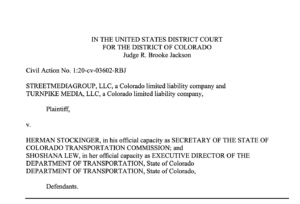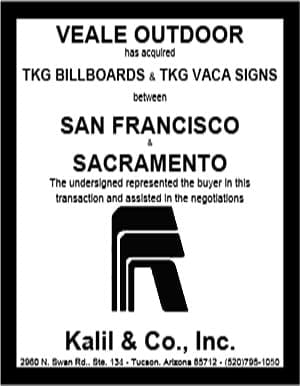 On December 6, 2021 the US District Court for the District of Colorado dismissed a request by Street Media Group and Turnpike Media to throw out Colorado’s billboard regulations. Street Media Group and Turnpike Media argued that Colorado State Department of Transportations sign rules were unconstitutional because they were impermissibly vague and content based. Here are the highlights from Judge R. Brooke Jackson’s ruling:
On December 6, 2021 the US District Court for the District of Colorado dismissed a request by Street Media Group and Turnpike Media to throw out Colorado’s billboard regulations. Street Media Group and Turnpike Media argued that Colorado State Department of Transportations sign rules were unconstitutional because they were impermissibly vague and content based. Here are the highlights from Judge R. Brooke Jackson’s ruling:
Out of Home Rules tied to compensation are constitutional.
“The Court finds that the language of the current act and rules is content-neutral. It requires permits for signs erected in exchange for compensation with reference to the content of the signs.”
The out of home rules are narrowly tailored to serve the public interest.
“The state’s interest in promoting safe driving alone satisfies the narrow-tailoring requirement…”
The Colorado rules are not impermissibly vague simply because you can’t tell whether a sign should be regulated by looking at it.
“The touchstone of vagueness, however, is the ability to understand what conduct is prohibited – it does not require that a visual inspection yield this understanding. For example, automative experts cannot, by studying a picture of a car, determine whether it meets emissions standards. But that does not mean that emissions standards are incomprehensibly vague. Similarly, a CDOT employee’s inability to predict, based on sight alone, whether a sign was erected for compensation and is therefore an “advertising device” does not mean that the definition of “advertising device” is incomprehensible.”
Billboard Insider’s take: Imagine the chaos if the court had ruled that an out of home regulatory scheme based on compensation is unconstitutional. Every sign code which was fixed after Reed v Gilbert would potentially be invalid. Before you cheer for the removal of all state sign rules you need to remember that just compensation is embedded in most state highway sign codes.
[wpforms id=”9787″]
Paid Advertisement

















